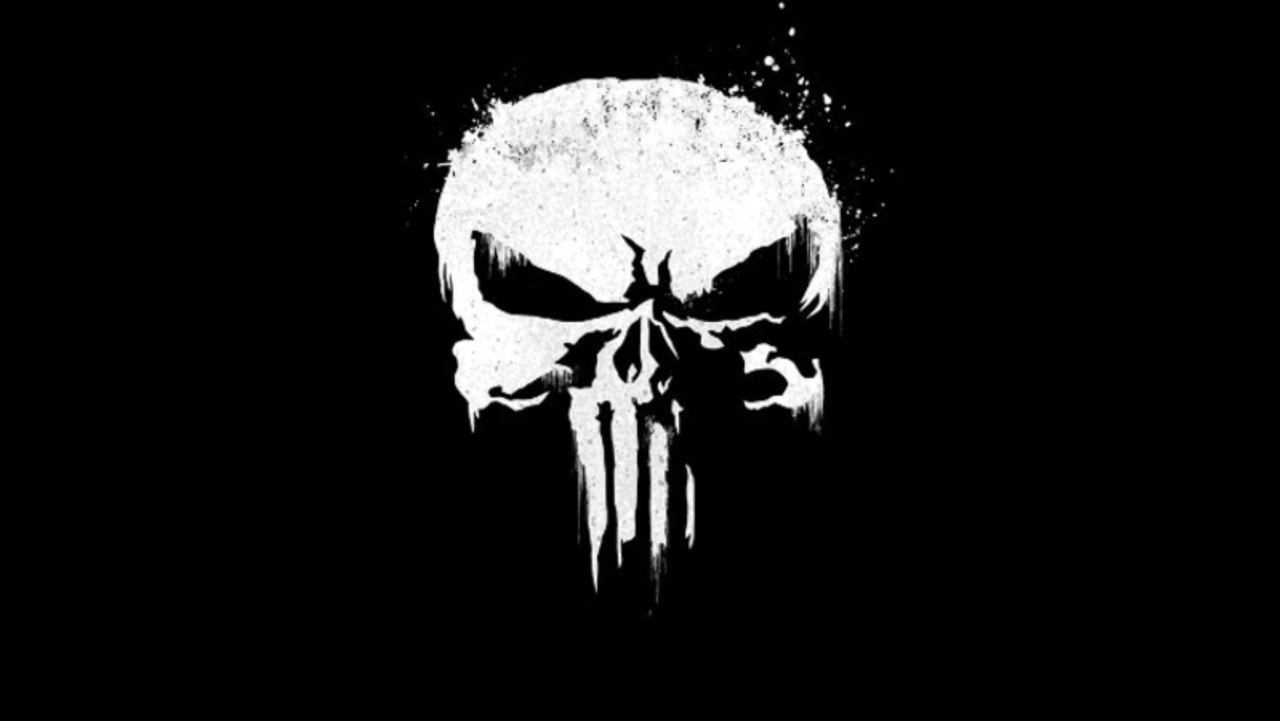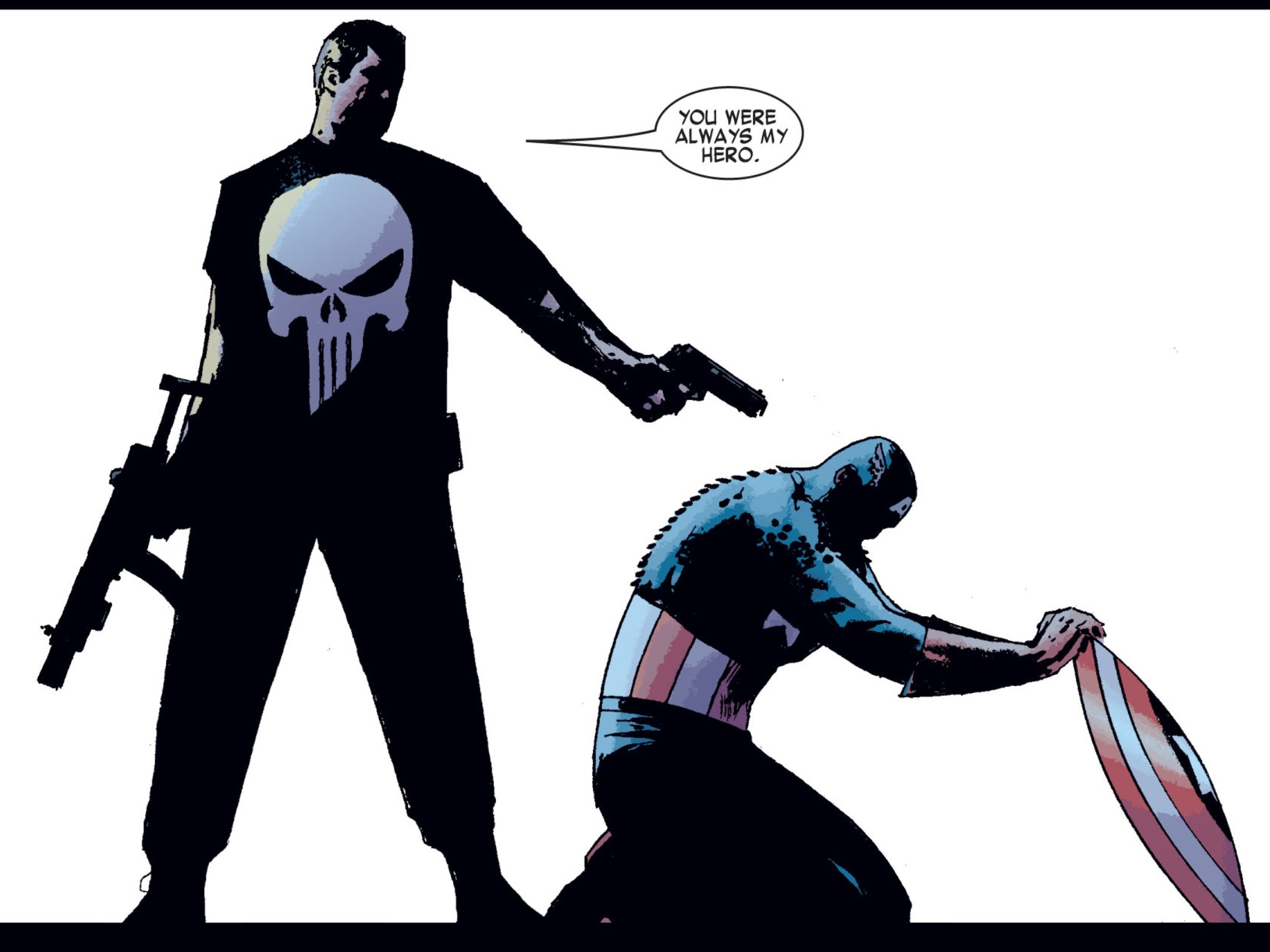It’s difficult to base a piece on a Twitter conversation, particularly one you half-remember and which you refuse to look up. I don’t want to look it up because there was nothing particularly unique about this back-and-forth; it’s more useful as an example of a type than as something particularly awful.
In a thread about a major X-Men writer’s astonishingly stupid comments about the series, one fan responded (something to the effect of): “I hope he gets fired. Comic books aren’t for right wingers.” “Well, except for The Punisher,” someone else responded. “The Punisher isn’t for right-wingers. Frank Castle never makes anything better. If you think Castle’s the hero, you’re not paying attention.”
I’m not sure why this claim stuck in my mind. I suppose it might have been this: that while Frank Castle, a.k.a. The Punisher, has sometimes been depicted as the villain in the stories in which he appears — he certainly was when he first showed up in The Amazing Spider-Man in 1974 — he has undeniably been the star of a number of stories in which he is presented more or less favorably.
 But the artificial brevity Twitter forced on this reader made me wonder about their argument. Of course things never “get better” in The Punisher’s comics — he’s a superhero. Nothing ever “gets better” in Gotham or Metropolis, or in Peter Parker’s New York City. There’s no end-game for most superhero comics, and if there is one, it will get unwritten pretty soon.
But the artificial brevity Twitter forced on this reader made me wonder about their argument. Of course things never “get better” in The Punisher’s comics — he’s a superhero. Nothing ever “gets better” in Gotham or Metropolis, or in Peter Parker’s New York City. There’s no end-game for most superhero comics, and if there is one, it will get unwritten pretty soon.
To use that to read The Punisher (and whatever comics have starred him over the years) as a liberal or leftist series is quite the bold move, and it made me realize that we, as the broader community of people who prattle about media on the Internet, seem to have a problem when it comes to talking about politics and media.
It seems to me that the current style of talking about this is an awkward hodgepodge of academic ideas that have been assembled together into a makeshift set of assumptions. Some of them aren’t too surprising — like the assumption that all forms of art, both high and low, are worth discussing. But when it comes to authorial presence and the meanings of a work, things get a little more complicated.
There’s an overwhelming desire, it seems, to draft pieces of media to one’s side, as all of superhero comics were to the left in this Twitter thread. (What about Steve Ditko’s explicitly Objectivist superhero Mr. A?) I’ve often seen this kind of drafting married to admonishment of those who don’t agree with it — that, in short, the liberal/leftist politics are there, and anyone who misses it is a “bad reader”. (This seems to come up a lot around YA fiction; I distinctly remember being called an incompetent reader for not appreciating the subtle anti-Maoist political nuances of The Hunger Games.)
But to position these works in this way, I often see artists making use of any and all forms of interpretation. To return to  The Punisher example: if the Twitterer was making the point that the way in which superheroes never seem to solve any real problems in the city and that every fantasy that things are OK falls apart at the start of the next issue ultimately means the work in question is left-leaning (by suggesting that something more fundamental needs to change than just another group of bank robbers being rounded up), then that is an interesting position worth exploring.
The Punisher example: if the Twitterer was making the point that the way in which superheroes never seem to solve any real problems in the city and that every fantasy that things are OK falls apart at the start of the next issue ultimately means the work in question is left-leaning (by suggesting that something more fundamental needs to change than just another group of bank robbers being rounded up), then that is an interesting position worth exploring.
But how much can we say that’s the work being left-leaning? Wouldn’t it be truer to say that the form of serial superhero storytelling is left-leaning? And even that seems a shaky thing to say. After all, every issue (or arc or whatever) does end with everything fine, with families safe in their homes from muggers, with maybe a couple of homeless people helped out but nothing really different. Someone left-leaning may read that and recognize in it a phony, moribund stasis, and may then turn from it to see it in real life, but it’s hard to say the work itself passes along that meaning.
It’s this looseness of interpretation that seems to me to counterbalance the placing of art on teams, left- and right-leaning. This looseness is also borrowed from academia, mostly from a hazy recollection of the day in class Barthes’ “Death of the Author” (PDF) was assigned as required reading.
We end up with conflicting forces, then. On the one hand, we want to categorize art as conservative or liberal; on the other, we want to open up art to the free flow of interpretation, in which every reading is equally valid. We want to make all art worthy of serious discussion and analysis, but we want to rank them in terms of political alliance. And those political positions often end up replicating what we instinctively like and instinctively find boring.
I want to quote here a long but terrific section from a book by Christian Metz, The Imaginary Signifier (PDF). That Metz is so rarely read these days, even by those who consider themselves Lacanians, is rather tragic; even if his claims to scientificity are completely overblown, his articles are so filled with wonderful passages that manage to pin movie-lovers to their place like a lepidopterist pins butterflies. From page 11 of Imaginary Signifier:
Consider cinematic historians: they very often act—and this is not to be regretted, for without this cast of mind we should have no cinematic documentation—as real cinema archivists, the keepers of an imaginary archive, in the sense in which Malraux’s Museum was imaginary. Their wish is to save as many films as possible; not qua copies, qua celluloid, but the social memory of those films and hence a by no means unfavorable image of them. The history of cinema often presents the appearance of an easy-going theodicy, a vast Last Judgment where indulgence will be the rule. Its real aim is to annex to the category of ‘interesting’ (a suitably valorizing variant of that ‘notable’ as defined by Roland Barthes) the maximum number of tracks. To this end various and sometimes contradictory criteria are called on, in a disparate and gossipy gathering: one film is ‘retained’ for its aesthetic value, another as a sociological document, a third as a typical example of the bad films of a period, a fourth as a minor work of a major filmmaker, a fifth as a major work of a minor filmmaker, a further one owes its inscription in the catalogue to its place in a particular chronology (it is the first film shot with a certain type of lens, or else the last made in Tsarist Russia)… The true function of this accumulation of criteria practiced by many historians of the cinema is to mention as many films as possible… and then to multiply as often as can be the number of points of view from which a film may be felt to be ‘good’ in one respect or another.
It’s a long passage, but one I think about often. I don’t think anyone has ever described my tendencies better, or those of my movie-loving friends. (Malraux’s museum without walls he invokes here — a place like a museum where disparate objects can be compared by being placed next to each other (an African mask next to a Renaissance painting, for example), but one that encompasses everything (in other words, the world itself) — is what I often think of looking at Letterboxd, a place in which all film viewings are mathematically equivalent.
Other than being a great passage, it reminds me of those who want to “draft” movies politically. Again, we have a kind of lenient aesthetic Last Judgment, in which almost everything will be brought to the right side — one through explicit political leanings, one through implicit political leanings, one through the structure itself leaning left, or being able to be read leaning left, one by being so right-wing that it reveals the holes in right-wing ideology. Why are we assembling this mass? The reasons are multiple, and too complex to get into here.
The only point, I suppose, that I want to make is this: we all need to think much harder about what it means for a film to be “on our side”.

